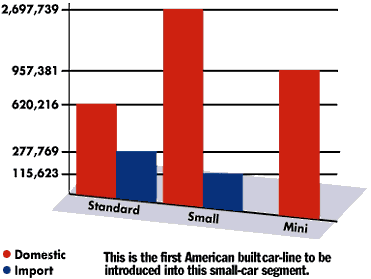Saturn Leaps Into
Japan's Most Competitive Market Segment
To the strains of the Carpenters' hit song Close to You, Saturn Japan
opened for business on April 5 with an aggressive marketing program to
sell the right-hand drive Saturn to Japanese consumers in one of the
world's most competitive small car markets. This is the first American
built car-line to be introduced into this small-car segment. The
Chrysler Neon, which was introduced last year, falls into the
standard-car category because of its greater width.
Saturn has taken a different approach to marketing than that used by
Saturn's General Motors parent in Japan, which has for the most part
chosen to sell cars through Yanase, a multi-franchise import agent.
Saturn Japan started with eight dealerships located in the most
highly populated areas of Japan - Tokyo, Nagoya, Osaka, Kobe and further
west in Okayama. As of the end of May, this had grown to 11 and by year
end Saturn plans to expand to 20 dealerships. While the network is still
small compared to Ford's 315 and Chrysler 188 dealer outlets, neither
the number of dealers nor sales volume appears to be of concern to
Saturn at the moment. The company says that it ". . . is not seeking
short-term sales gains in Japan but rather is putting priority on
getting strong support from customers through high quality and superior
service." Clearly the company is proceeding carefully.
Saturn has also sought to separate itself from the traditional image
of other Big Three products in Japan. Saturn is aggressively portraying
itself to the Japanese media as a new American company with a new
outlook toward vehicle production and marketing. In its Japanese
language advertising Saturn tells the consumer why Saturn was built in
Tennessee, not in Detroit. The answer: "Both the dealerships and Detroit
factories had lost the dream of the way things should be; they had no
vision for tomorrow. Saturn was built starting from zero, the way a new
company should be."
Saturn is directly addressing one of the major customer concerns in
Japan, the availability of parts and aftermarket servicing on U.S.
imports. The company is promising to have dealers stock key replacement
parts or otherwise have parts available within 24 hours from a service
parts warehouse located in Kanagawa Prefecture, south of Tokyo. Saturn
has surveyed the costs of replacement parts of Japanese vehicles and
promises to meet their average price for both labor and parts.
Keith Wicks, the General Director of Saturn Japan, says, "We are very
serious about marketing in Japan. The hurdle of meeting Japanese
consumer expectations is extraordinarily high. Vehicles which are sold
in the Japanese market can be sold anywhere in the world. We understand
that the Japanese market with its mature society and excellent vehicles
is an extraordinarily competitive one."
Saturn is entering Japan's crowded small car market, which is defined
to include vehicles with engine capacity between 661cc to 2,000cc, along
with certain height, length and width specifications. In 1996, there
were 2.7 million of these small cars sold in Japan, representing nearly
60 percent of Japan's total passenger car market. While imports have
been able to capture as much as 31 percent of Japan's standard-car
market, over 2,000cc, they currently have about 4 percent of the more
intensely competitive small-car market.
One of the most successful small-car imports in Japan has been
Saturn's German cousin, the GM Opel, which has seen its small car
models, the Astra, Vita, Calibra and Tigra increase by 77 percent over
the last two years from 17,178 to 30,346 units. Other successful models
include VW's Golf and Polo, BMW's 318i and 320i series, and, from the
United Kingdom, Rover's Cooper.
In the past, imports from the U.S. Big Three car companies have had
less success competing in Japan than have their European counterparts.
Saturn, however, has a good opportunity to compete for the hearts, minds
and yen of Japanese consumers.
1996 Japanese Passenger Car Market
(by market segment, import vs. domestic)
